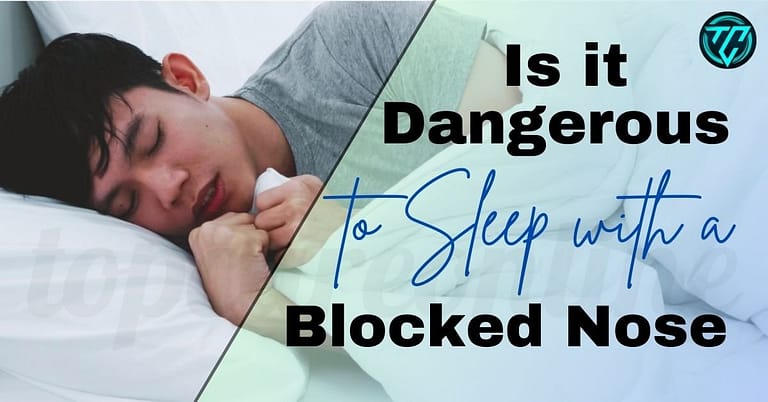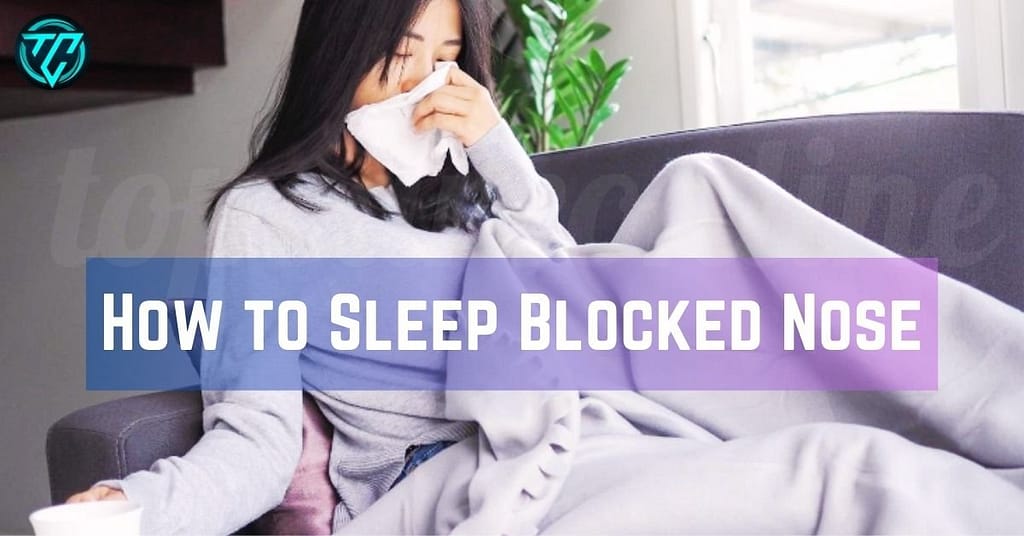On This Page:
Is it Dangerous to Sleep with a Blocked Nose ?
Treatment for Blocked Nose at Night
Will a Humidifier Help with Stuffy Nose at Night?
Blocked Nose at Night Home Remedies
Sleeping with a blocked nose can be incredibly uncomfortable, but is it actually dangerous?
Many people experience nasal congestion due to allergies, colds, or sinus infections, but not everyone knows how this can affect their sleep and overall health. In this post, we’ll explore the potential risks of sleeping with a blocked nose, why it happens, and what you can do to manage it.
Why Do You Get a Blocked Nose at Night?
A blocked nose, or nasal congestion, occurs when the nasal passages become inflamed, restricting airflow. This can be caused by:
- Allergies: Pollen, pet dander, dust mites, and other allergens often trigger nasal congestion.
- Colds or Sinus Infections: Viruses and bacterial infections can lead to inflamed nasal tissues.
- Dry Air: Especially during winter, dry indoor air can irritate the nasal passages, leading to congestion.
- Deviated Septum: A structural issue in the nose can block airflow on one or both sides, worsening during sleep.
- Lying Flat: When lying flat, gravity affects mucus drainage, causing it to pool in the nasal passages.
The question is, should you be concerned about sleeping with a blocked nose, or is it just an uncomfortable nuisance?
Is it Dangerous to Sleep with a Blocked Nose ?
Sleeping with a blocked nose isn’t usually dangerous for most people, but there are several potential risks and complications you should be aware of:
1. Interrupted Sleep and Fatigue
Blocked nasal passages can lead to poor sleep quality. People with nasal congestion may find themselves waking up multiple times during the night, gasping for air, or feeling uncomfortable. This lack of quality sleep can result in fatigue, irritability, and difficulty concentrating during the day.
2. Breathing Through the Mouth
When your nose is blocked, you’re forced to breathe through your mouth, which can cause:
- Dry Mouth and Throat: Mouth breathing leads to dryness, making you more prone to sore throats, gum issues, and even cavities.
- Snoring: People with blocked noses are more likely to snore, disrupting their own sleep and the sleep of others.
3. Increased Risk of Sleep Apnea
For some individuals, especially those with underlying conditions like sleep apnea, a blocked nose can exacerbate the problem. Sleep apnea is a condition where breathing repeatedly stops and starts during sleep. If left untreated, it can lead to serious health problems, including heart disease and high blood pressure.
4. Impaired Oxygen Intake
While it’s rare, prolonged and severe nasal congestion can limit oxygen intake. This is particularly concerning for people with respiratory conditions like asthma or chronic obstructive pulmonary disease (COPD). Limited oxygen intake during sleep can result in morning headaches and feelings of lethargy.
5. Impact on Mental Health
Chronic nasal congestion can take a toll on mental health. The combination of poor sleep and constant discomfort can lead to anxiety, frustration, and even depression over time.
Treatment for Blocked Nose at Night
Dealing with a blocked nose at night can disrupt your sleep and leave you feeling exhausted the next day. Here are some effective treatments to relieve nasal congestion and improve your sleep:
What to Do If You Have a Blocked Nose at Night
Thankfully, there are many ways to alleviate a blocked nose and improve your sleep quality. Here are some effective solutions:
1. Use a Humidifier
Dry air can worsen nasal congestion. Using a humidifier in your bedroom helps keep the air moist, which can soothe irritated nasal passages and promote easier breathing.
Will a Humidifier Help with Stuffy Nose at Night?
Yes, a humidifier can be very helpful for a stuffy nose at night. Here’s how it works and why it’s beneficial:
How a Humidifier Helps with a Stuffy Nose at Night:
1. Adds Moisture to the Air
- A humidifier adds moisture to dry indoor air, which helps prevent your nasal passages from drying out. Dry air can irritate and worsen congestion.
- The added moisture helps to loosen mucus, making it easier to clear your nasal passages.
2. Eases Nasal Congestion
- By keeping the air moist, a humidifier helps reduce the inflammation in your nasal passages, making it easier to breathe through your nose.
- It can help thin out mucus, which can relieve blockages and make it easier for the mucus to drain.
3. Soothes Irritated Nasal Passages
- If your nose is irritated or inflamed from a cold, allergy, or other causes, a humidifier can calm the irritation and provide relief from discomfort.
- It also helps prevent the lining of your nose from becoming too dry, which can make congestion worse.
4. Improves Sleep Quality
- Sleeping in a room with a humidifier can help you breathe more easily at night, allowing you to sleep better despite a stuffy nose.
- It can also reduce snoring caused by dry air and congestion.
Tips for Using a Humidifier for a Stuffy Nose:
- Place the humidifier close to the bed but not too close to avoid excess moisture buildup.
- Use distilled or demineralized water to prevent mineral buildup and bacteria growth in the humidifier.
- Clean the humidifier regularly to prevent mold and bacteria from developing, which could worsen respiratory issues.
In summary, a humidifier is an effective and natural way to help relieve a stuffy nose at night, especially if you’re dealing with dry air or congestion from a cold or allergies.
2. Nasal Strips
Nasal strips are adhesive bands that open up the nasal passages from the outside, making it easier to breathe through your nose while you sleep.
3. Saline Nasal Spray
Saline nasal sprays can moisturize the nasal passages and reduce inflammation, offering temporary relief from a blocked nose. It’s a gentle and safe solution, even for frequent use.
4. Allergy Management
If your blocked nose is caused by allergies, reducing exposure to allergens is key. Regularly wash your bedding, vacuum your room, and consider using an air purifier to minimize allergens in the air.
5. Decongestants and Antihistamines
Over-the-counter medications like decongestants or antihistamines can provide quick relief for a blocked nose, particularly if allergies or a cold are the root cause. However, these should only be used short-term, as long-term use can lead to rebound congestion.
By following these treatments, you can effectively manage a blocked nose at night and enjoy a more restful sleep!
Blocked Nose at Night Home Remedies
If you’re struggling with a blocked nose at night, several natural home remedies can help clear your nasal passages and promote better sleep. Here are some effective options:
Treatment for Blocked Nose at Night Home Remedies
1. Steam Inhalation
Inhaling steam before bed helps loosen mucus and open up congested nasal passages. You can add a few drops of eucalyptus or peppermint oil to hot water for added relief. Breathe in the steam for about 5–10 minutes.
2. Warm Compress
Applying a warm compress to your face can help relieve sinus pressure and clear blocked nasal passages. Soak a clean cloth in warm water, wring it out, and place it over your nose and forehead for several minutes.
3. Saline Rinse (Neti Pot)
A saline rinse or neti pot can effectively flush out mucus from your nasal passages, reducing congestion. Use a saline solution made of salt and warm distilled water to gently rinse your nasal cavities.
4. Stay Hydrated
Drinking plenty of water, herbal tea, or warm broths throughout the day keeps your mucus thin and prevents it from blocking your nose. Staying hydrated helps your body combat the causes of congestion more effectively.
5. Honey and Ginger Tea
A warm cup of honey and ginger tea before bed can soothe a blocked nose and reduce inflammation. Honey has natural antibacterial properties, while ginger helps with sinus drainage.
6. Elevate Your Head
Use extra pillows to elevate your head while sleeping. This prevents mucus from pooling in your nasal passages and helps you breathe more easily throughout the night.
7. Essential Oils
Diffuse essential oils like eucalyptus, tea tree, or peppermint in your bedroom. These oils have natural decongestant properties that can clear blocked nasal passages and help you sleep better.
8. Onion Vapor
Cutting an onion and placing it near your bedside can help open up your nasal passages. Onions contain sulfur compounds that work as natural decongestants when inhaled.
9. Garlic
Eating a clove of raw garlic or adding it to your meals can help reduce nasal congestion, as garlic has natural antibacterial and anti-inflammatory properties.
These home remedies are simple yet effective in treating a blocked nose at night, helping you breathe more easily and sleep more comfortably.
When to See a Doctor
While a blocked nose is usually not dangerous, it’s important to consult a healthcare professional if:
- Your congestion persists for more than 10 days.
- You have a fever or green/yellow mucus, which could indicate a sinus infection.
- You experience frequent nosebleeds.
- You have symptoms of sleep apnea, such as loud snoring, gasping for air during sleep, or excessive daytime fatigue.
How to Sleep Blocked Nose
Dealing with a blocked nose at bedtime can be incredibly frustrating. It’s tough to get comfortable, and sleep often feels impossible when you’re struggling to breathe through your nose. But don’t worry — there are effective ways to manage nasal congestion so you can enjoy….
Read More:
Which side to sleep with blocked nose?
Dealing with a blocked nose can make sleeping difficult, especially when you’re unsure of the best position to alleviate congestion. While it might seem like a small issue, your sleeping position plays a significant role in how well you breathe through the night..
Read More:
Final Thoughts: Take Control of Your Sleep
Sleeping with a blocked nose can feel overwhelming, but it’s not something you should ignore. While it may not always be dangerous, the impact on your sleep quality, health, and well-being can be significant. By following some simple steps to alleviate congestion and seeking medical help when necessary, you can improve your sleep and avoid potential complications.
Don’t let a blocked nose keep you from getting a good night’s sleep. Try the solutions mentioned above, and take action to breathe easier and rest better.


